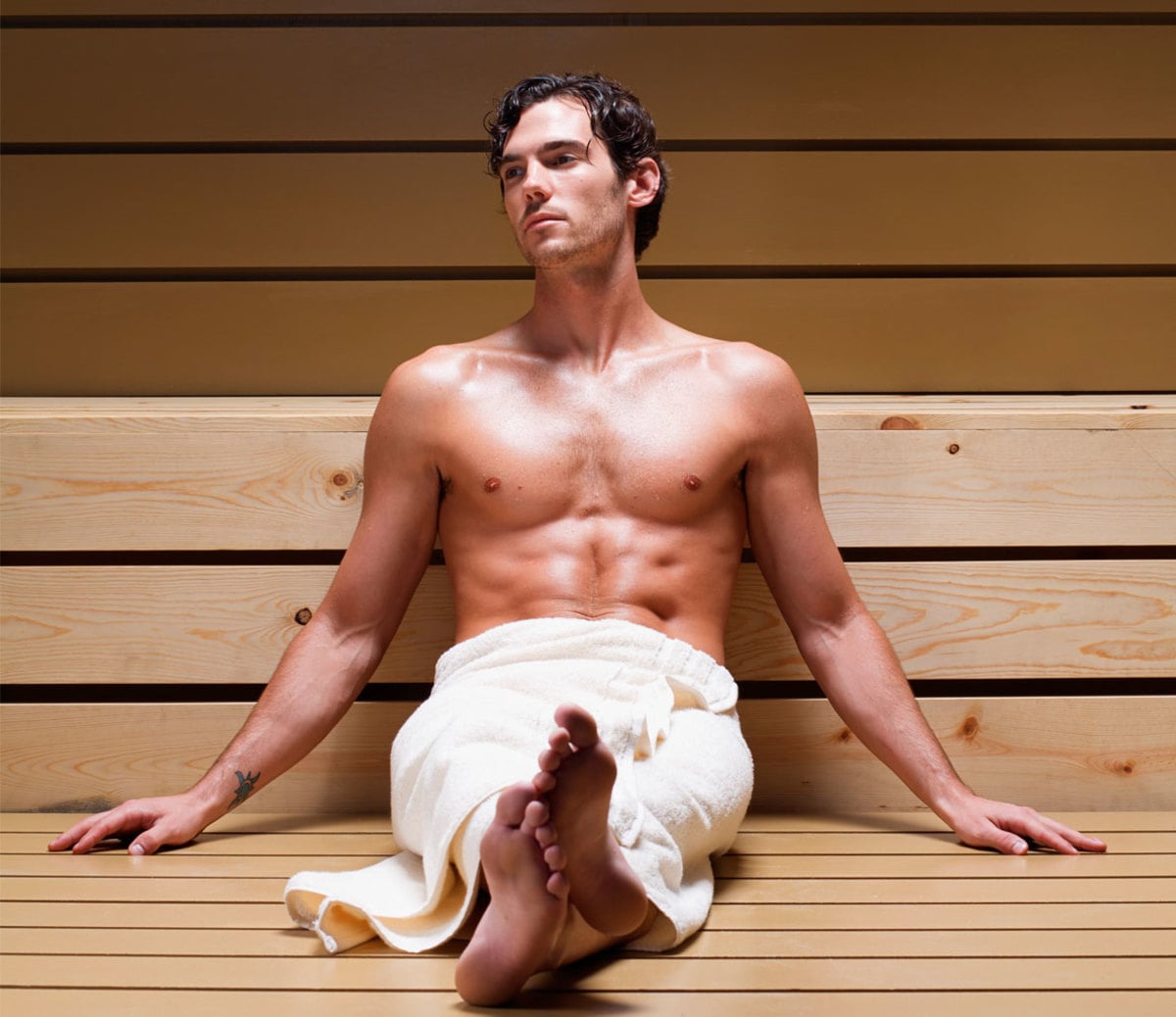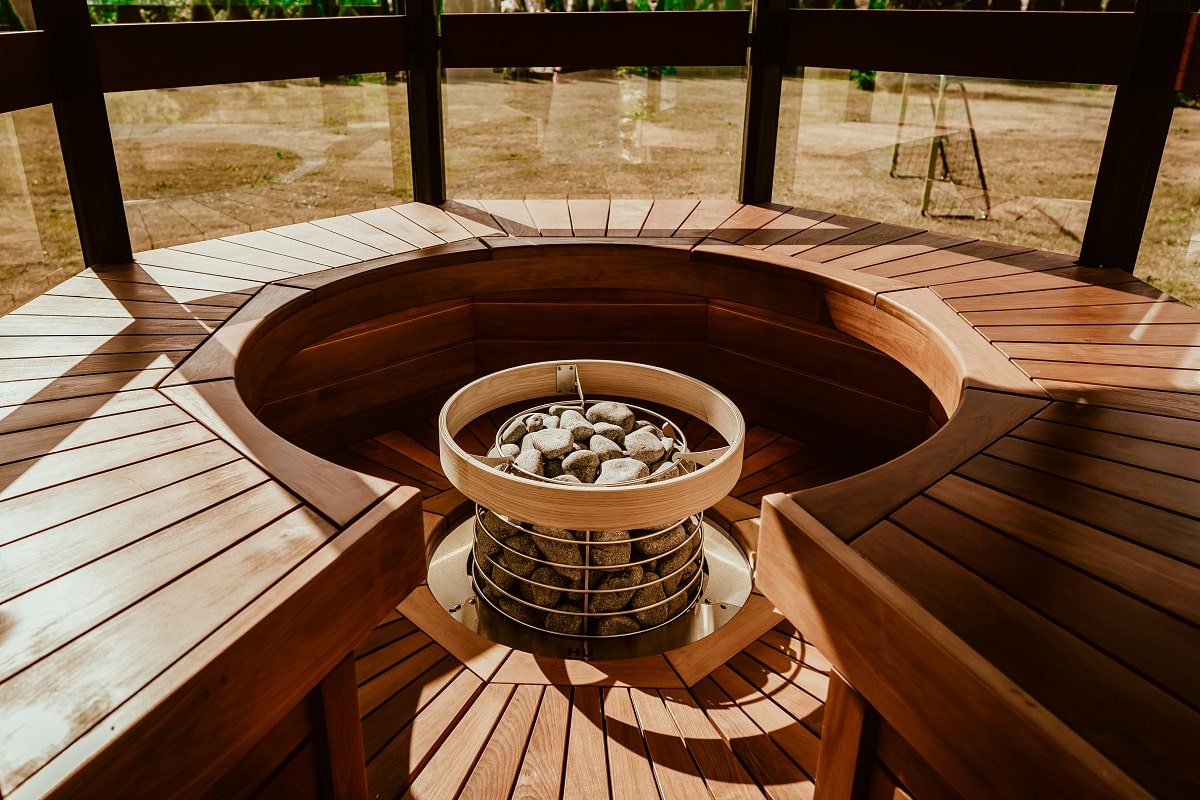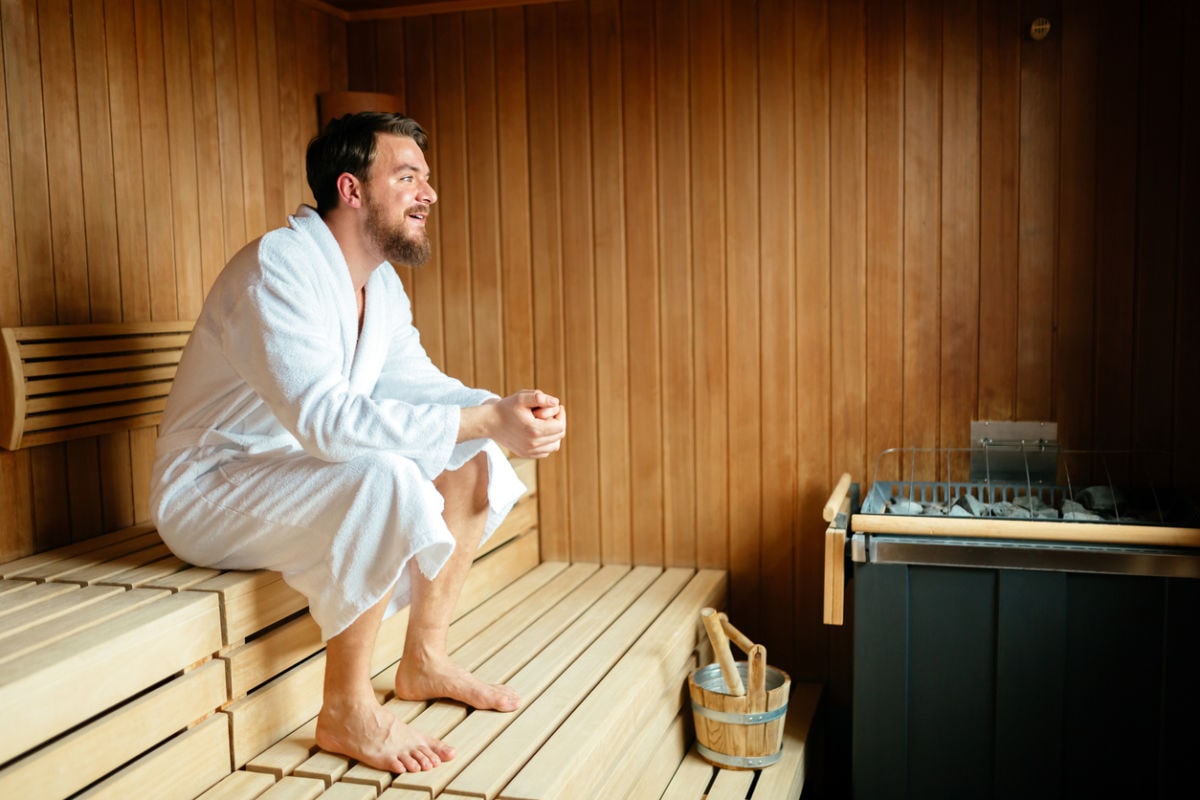1
HOME > Health & Fitness >
FROM THE GYM TO THE SAUNA: HOW INFRARED HEAT BOOSTS MEN'S HEALTH
Written by Menswear Style in Health & Fitness on the 9th May 2024

The integration of infrared saunas into men's health routines, particularly following physical exercise, has garnered significant attention for its potential benefits. This article delves into the science behind infrared saunas, their types, and the myriad of health advantages they offer, especially in terms of heart health, muscle recovery, and detoxification. Additionally, practical advice is provided to ensure a safe and effective sauna experience.
Understanding Infrared Saunas
Infrared saunas differ from traditional saunas by using infrared panels or lamps to directly heat the body, rather than heating the air around it. This method allows for potential deeper tissue penetration, offering a unique therapeutic experience. The infrared light emitted by these saunas is absorbed by the skin's surface, leading to a gentle warming effect that many find more tolerable than the intense heat of conventional saunas. The benefits of infrared heat are attributed to its ability to induce a deep sweat at lower temperatures. This can be particularly advantageous for those who might struggle with the high heat of standard saunas. Moreover, the infrared sauna's heat penetrates up to 2 inches deep, providing a uniform warmth that can enhance the body's natural detoxification process through sweating. While infrared saunas are celebrated for their health benefits, it's essential to consider the type and size of the sauna for personal or shared use. Additionally, concerns about EMF and ELF exposure are worth noting, although many modern saunas are designed to minimize these risks. When selecting an infrared sauna, it's important to choose the right sauna size based on personal or shared use.

Types of Infrared Saunas
Infrared saunas come in various types, each offering unique benefits and experiences. The most common distinction is between near and far infrared saunas. Near-infrared saunas use light to deliver heat directly to the body, promoting skin rejuvenation and wound healing. Far infrared saunas, on the other hand, penetrate deeper into the body's tissues, aiding in detoxification and relaxation. When considering an infrared sauna, it's essential to evaluate the type that best suits your health goals. Here's a quick comparison:
Near Infrared Saunas: Ideal for skin therapy and surface-level heat treatment.
Far Infrared Saunas: Best for deep tissue warmth and overall wellness.
Sauna benefits include immediate relaxation and long-term health improvements with consistent use. Choose sauna size based on personal or shared use. The warranty covers defects and prompt support for damaged parts. Satisfaction is guaranteed with a flexible return policy. Remember to consider the material and build quality of the sauna, as these factors significantly impact the longevity and safety of your investment. High-quality materials like Canadian cedar or hemlock not only ensure durability but also enhance the sauna experience with their natural aromas.
Health Benefits of Infrared Sauna Use
By using infrared light to create heat, it penetrates deeper into the skin than traditional saunas, promoting a more intense and therapeutic sweat. Regular sessions can improve circulation, aid in detoxification, and even relieve chronic pain, enhancing overall health and well-being.
Boosting Heart Health
Transitioning from the gym to the sauna can be a pivotal step in enhancing men's cardiovascular health. Infrared saunas, in particular, have been shown to support heart health by improving circulation and potentially lowering resting heart rates over time. This gentle yet effective heat therapy can lead to significant improvements in cardiovascular functioning, including reduced blood pressure and increased heart rate variability—a key indicator of cardiac resilience and stress management. (Learn how you can prevent heart disease). The therapeutic effects of infrared saunas extend beyond relaxation, offering a proactive approach to maintaining and improving heart wellness. Regular sauna sessions may also lower the risk for conditions such as diabetes by regulating glucose levels and increasing plasma volume. The body's heat shock proteins, activated by the sauna's heat, play a crucial role in these health benefits. Here's a quick look at how sauna use can impact key aspects of heart health:
Improved Circulation: Enhanced blood flow to muscles and organs.
Lowered Blood Pressure: Contributing to reduced cardiovascular disease risk.
Increased Heart Rate Variability: Indicative of better stress response.
Regulation of Glucose Levels: Potentially reducing the risk of diabetes.
Embracing the warmth of an infrared sauna could be a transformative element of a holistic approach to health, seamlessly integrating with a fitness regimen for optimal results.

Enhancing Muscle Recovery
Infrared saunas are a powerful tool for enhancing muscle recovery, especially after strenuous exercise. The deep-penetrating infrared heat helps to relax muscles and alleviate stiffness, reducing soreness and Delayed Onset Muscle Soreness (DOMS). This is achieved by increasing blood circulation, which not only delivers essential nutrients and oxygen to fatigued muscles but also aids in the removal of metabolic waste products like lactic acid. The improved blood flow from infrared sauna sessions can accelerate the recovery process, allowing for shorter downtime between workouts. Many fitness professionals advocate for the use of infrared saunas post-exercise. AJ Mason, an American Council on Exercise-certified trainer, notes that heat brings nutrients and oxygen to muscles, aiding in relaxation and recovery. This can lead to a more refreshed feeling after a workout, setting the stage for better performance in subsequent sessions.
Infrared Saunas and Workout Recovery
Integrating sauna sessions into your post-workout routine can significantly enhance muscle recovery and relaxation. Heat therapy through sauna use is known to increase blood flow, delivering more oxygen and nutrients to tired muscles, thus aiding in the repair process. AJ Mason, a certified trainer, emphasizes the role of heat in helping muscles relax and recover, reducing soreness, and providing a refreshed feeling after intense physical activity. Experts recommend a sauna duration of about 15 to 20 minutes post-exercise to achieve optimal benefits without risking overheating or dehydration. It's crucial to monitor your core temperature, aiming for a range of 101 to 102 degrees Fahrenheit. Below is a guideline for a post-workout sauna session:
- Start with a cooldown period after your workout to gradually lower your heart rate.
- Hydrate adequately before entering the sauna to prevent dehydration.
- Spend 15 to 20 minutes in the sauna, focusing on deep breathing and relaxation.
- Exit the sauna and engage in a gradual cooling process, such as a lukewarm shower.
- Rehydrate and rest to allow your body to recover fully.
While sauna use does not replace traditional muscle workouts, it complements your fitness regimen by potentially enabling you to push harder and recover more swiftly. Remember to listen to your body and adjust the duration and frequency of sauna sessions to suit your individual needs and fitness goals.

Sauna Use and Sweat: Detoxifying the Body
The process of sweating in an infrared sauna is not only a means to cool down the body but also a powerful tool for detoxification. Infrared wavelengths penetrate the skin, stimulating the sweat glands and increasing circulation, which aids in expelling toxins directly through the pores. This natural detoxification at a cellular level can lead to a boosted immune system and the alleviation of aches and pains. The enhanced detoxification provided by infrared saunas can be a significant addition to one's health regimen, promoting the removal of impurities and improving overall well-being. While the benefits of detoxification are clear, it's important to approach sauna use with mindfulness and respect for the body's limits. Users should exit the sauna if they feel faint or ill, and it's advisable to consult with others before adjusting the temperature. Here are some practical tips to ensure a safe and beneficial sauna experience:
- Hydrate adequately before and after sauna sessions.
- Start with shorter sessions and gradually increase the duration.
- Listen to your body and exit the sauna if discomfort arises.
- Allow time for your body to cool down post-sauna.
For those considering incorporating a sauna into their home, it's beneficial to compare different models and features. The Biohacking Academy, for instance, provides insights on home saunas and their skin benefits. When selecting a sauna, consider factors such as size, warranty coverage, and return policies. For personalized guidance, don't hesitate to contact the experts.
Practical Tips for Sauna Use
When visiting a sauna, it's crucial to adhere to certain etiquette and safety guidelines to ensure a pleasant experience for all. Hydration is key; always drink plenty of water before entering the sauna to prevent dehydration. It's also advisable to avoid heavy meals right before your session, as this can cause discomfort. Here are some additional tips to keep in mind:
- Wear appropriate clothing or a bathing suit if it's a mixed-sex sauna.
- Sit on a towel to maintain hygiene and absorb sweat.
- Avoid using the sauna if you have acute health issues like fever or cardiovascular problems.
- Shower before and after your sauna session to remove impurities.
- Respect the silence and privacy of others; refrain from loud conversations or phone use.
Safety should never be an afterthought in the sauna. Familiarize yourself with the location of emergency exits and ensure you know how to alert others in case of an emergency. It's better to leave the sauna if you start feeling unwell or dizzy. Remember, the goal of a sauna visit is relaxation and health improvement. By following these guidelines, you can enjoy the benefits of the sauna while minimizing risks.

Making the Most of Your Sauna Session
To fully reap the benefits of your sauna session, it's essential to understand the best practices for sauna use. Start with shorter sessions and gradually increase the duration as your body acclimates to the heat. Experts suggest beginning with five-minute sessions and then adding a few minutes each time. This gradual approach helps your body adapt and can prevent overheating and dehydration. When it comes to frequency, consistency is key. Incorporating sauna sessions a few times a week can enhance training responses and improve skin strength. As you become more comfortable, you can increase your usage to suit your personal health goals. While the sauna experience is primarily about relaxation and detoxification, it's also a time to enjoy the silence and disconnect from the digital world. Ensure your sessions are a tranquil retreat by leaving your phone behind and engaging in quiet reflection. Lastly, pay attention to how you feel during and after your sauna sessions. Listening to your body is crucial for a safe and beneficial experience. If you have any pre-existing health conditions, consult with your doctor to ensure sauna use is appropriate for you.
Conclusion
In conclusion, the integration of infrared saunas into men's health routines offers a multitude of benefits, from enhancing heart health and muscle recovery to aiding in detoxification after a workout. The deep penetration of infrared heat not only provides a more tolerable environment for those sensitive to traditional sauna temperatures but also ensures a more efficient and vigorous sweat. With the right approach to sauna etiquette, safety, and regular use, men can experience improved circulation, skin health, and overall well-being. It's clear that infrared sauna are more than just a luxury; they are a valuable tool for maintaining and improving men's health, complementing gym efforts with a relaxing yet potent wellness experience.
Trending
2
3
4
5
6
7
8
9
10









